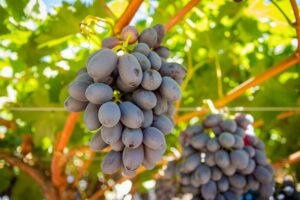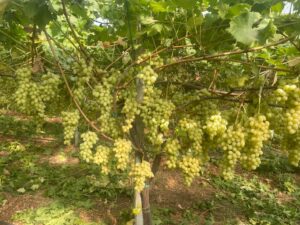Climate pressure, rising input costs and tighter market requirements are pushing producers to rethink how they grow and pack fruit. Water, in particular, has become a critical resource in many grape-growing regions.
Pearl™ varieties from Grape Evolution are developed with these realities in mind, combining water-wise performance, robust field behavior and strong market appeal.
Why Water Efficiency Matters
Water scarcity affects every link of the value chain:
- Yield stability, when inconsistent irrigation leads to smaller berries and weaker bunches
- Fruit quality, as over- or under-irrigation impacts texture, sugar accumulation and cracking
- Production cost, with energy and pumping costs rising year after year
- Market access, as buyers increasingly look for suppliers with sustainable practices
The solution is not only better irrigation systems, but also varieties that naturally perform well with lower water input.
Pearl™ Varieties and Reduced Water Use
Several Pearl™ varieties are designed to operate with significantly lower water requirements compared to traditional grapes of similar timing:
- Early Pearl (VARO 214) – around 30% less water than standard references
- Desert Pearl (VARO 228) – comparable irrigation reduction while keeping natural berry size
- Mountain Pearl (VARO 207) – approximately 40% less water than many late red grapes
- Late Pearl (VARO 308) – around 40% less water compared with classic late white varieties
For growers, this means protecting orchards and margins, especially in regions facing drought, restrictions or high water costs.
Less Labor, Less Waste, More Value
Water-wise performance in Pearl™ grapes is paired with practical vineyard advantages.
Lower labor requirements
Desert Pearl and Late Pearl require no thinning and no sizing, which reduces the number of passes in the field and the dependency on seasonal labor. Fertility and bunch structure are designed for consistent, commercial crops.
Strong behavior under rain and humidity
Pearl™ varieties are selected for excellent behavior under rain and humidity, helping to minimize:
- Cracking
- Decay pressure
- Emergency harvests and unplanned logistics
This resilience helps maintain quality and shelf life, even when weather is not perfect.
Better shelf life and reduced waste
Thanks to their structure and carefully defined harvest windows, Pearl™ grapes are built for stable condition on arrival, strong crunch after travel and less waste at destination and retail. This benefits every step in the chain, from growers to packers, importers and retailers.
Sustainability That Works in the Real World
Sustainability is only meaningful when it works economically and operationally for producers and buyers.
Pearl™ varieties combine:
- Reduced water use
- Lower labor
- Robust field behavior
- Premium eating quality
This creates a practical sustainability model: better use of resources, reduced waste and a product consumers enjoy and return to.
Partnering with Grape Evolution
Grape Evolution doesn’t only provide plant material. The team works with growers and partners to:
- Share farming protocols tailored to climate and soil
- Support evaluation and adaptation of Pearl™ varieties
- Help design commercial programs that align with buyer requirements
For vineyards planning a new project or replanting a block, integrating Pearl™ water-wise varieties can be a strong step toward more resilient production.
If you are looking for grape varieties that help balance sustainability, quality and profit, Grape Evolution is ready to discuss options and next steps.

